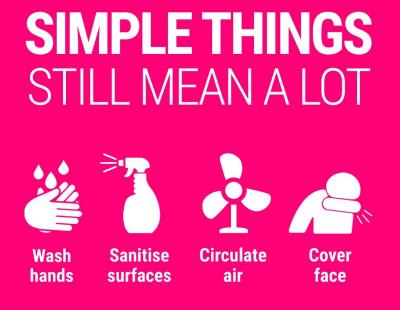Microbes that are usually spread through faeces, as well as many different types of fungus, were discovered on items such kettles, fridge door handles, coffee machines and microwave buttons.
The findings follow a study commissioned by the Champs Public Health Collaborative –an organisation led by Cheshire and Merseyside’s nine Directors of Public Health – in which microbiologists analysed a set of swabs taken from shared kitchen areas across a range of different sectors.
From office settings to construction sites, the investigation revealed how high touchpoints could be playing a major role in the spread of bacteria which could eventually lead to illnesses, especially among those with weakened immune systems.
Under examination, the swab samples revealed the presence of Escherichia coli (E.coli) – a bacterium that can lead to a range of gastro-intestinal illnesses – on a coffee machine, fridge door handle and microwave control panel.
A bacterium called Pseudomonas, which is often associated with respiratory infections, was also discovered on these three items. Plus, evidence of Klebsiella, a microbe usually found in the human intestine and also spread via faeces, was present on almost all 11 kitchen items.
Microbiologists also reported how each item was rife with fungi, with fridge door handles being among the worst affected.
Dr Adam Roberts, one of the chief researchers within the Infection Innovation Consortium (iiCON), which is led by the Liverpool School of Tropical Medicine (LSTM), led the study. He says that, while many of the bacteria and fungi are everywhere all the time, they can pose a threat to those who already have weakened immune systems.
Dr Roberts, Reader in antimicrobial chemotherapy and resistance at LSTM, said: “We live among bacteria and fungi, coming into contact with them every single day as we go about our normal lives.
“Some microbes, if ingested into our bodies, can lead to illness and infection, so the easiest way to help prevent this from happening is to wash our hands regularly, especially after going to the toilet, and before and after eating.
“The results from this study showed communal kitchen areas to be full of various types of bacteria, many of which can be found in faeces. This is, of course, an extremely unpleasant thought but one which could indicate that people are simply not washing their hands thoroughly – or at all – after going to the toilet and then going to make themselves a cup of tea or preparing their lunch, for example.
“The potential knock-on effect of this is that, if an individual who is more susceptible to infection, then touches those same surfaces, they may be at risk of becoming ill. The simple way to try to minimize this risk though is to practise good hand hygiene as much as possible.”
The study is part of a wider campaign, Simple Things, which is being run by the Champs Public Health Collaborative in partnership with NHS Cheshire and Merseyside to encourage people to help reduce the spread of illnesses such as flu, norovirus and the common cold.
Simple Things was launched after researchers found that two thirds of people are worried about the spread of infectious diseases this winter, with younger people having the most concerns.
The initiative calls on both the public and businesses to practise four key measures to prevent the spread of illness - hand washing, sanitising surfaces, keeping distance when unwell and covering sneezes or coughs.
Now, the Collaborative is urging workers and employers to play their part and step up their hand hygiene, paying particular attention to communal areas such as kitchens and shared workspaces.
Thara Raj, Director of Public Health for Warrington, and Cheshire and Merseyside’s Lead Director of Public Health for Health Protection, said: “Following the pandemic, it’s fantastic to see so many people returning to in-person working, interacting with their colleagues and collaborating with their team once again.
“But of course, each time we go to work, whatever the setting might be, we are likely to be constantly touching surfaces that contain multiple bacteria. Shared kitchens, which almost every workplace will have, are busy areas with a high footfall, meaning cross-contamination and the associated risk of illness is very likely.
“Fridge door handles, coffee machines and kettles seemed to be the places where the most bacteria was, all of which are items that we’ll likely touch several times each day.
“The key thing to remember is that these bacteria are completely invisible to the naked eye so, while these items may look clean, they could in fact be home to lots of different microbes.
“We can’t avoid touching items like this while at work – and we shouldn’t – but there are simple things that we can do minimise their impact, particularly if you have a pre-existing medical condition or you are visiting loved ones in care homes or in hospitals, for example.
“So, it’s vital that we all do what we can to help reduce the spread of infections, all year round.”
For more information about the Simple Things campaign, visit: www.simplethings-nhs.com
